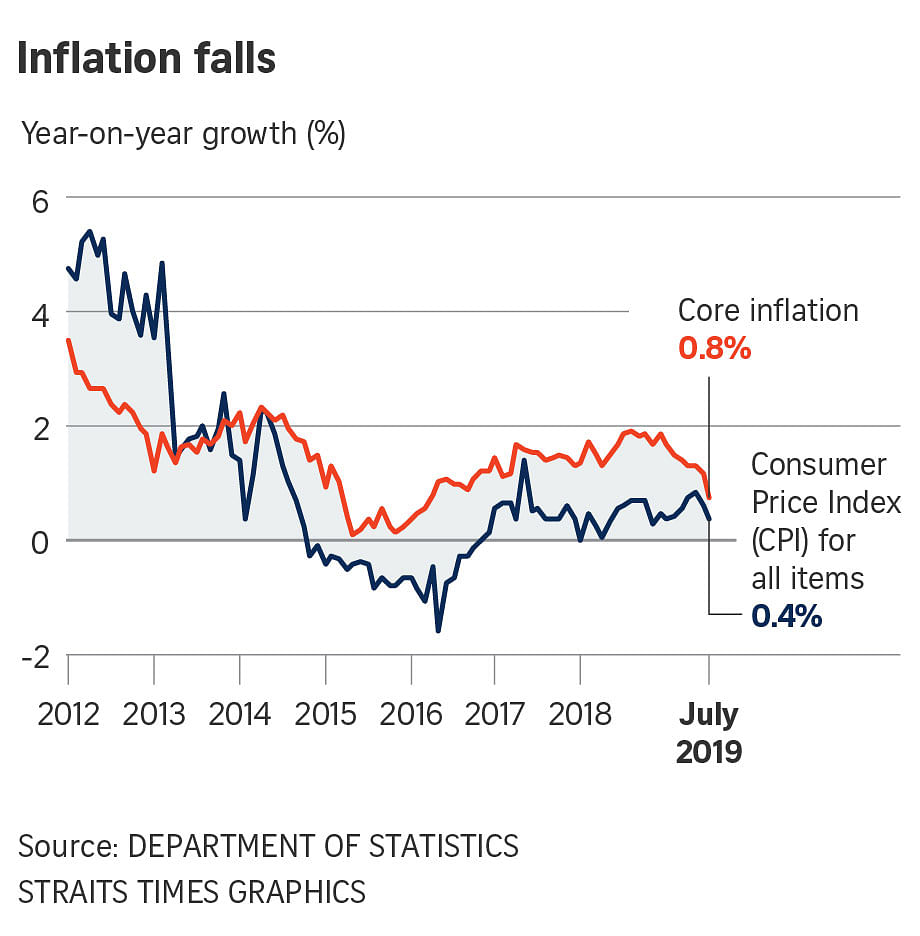Broad-based weakness in consumer prices caused core inflation to fall to its lowest level in more than three years in July - a sign of the economic downturn taking its toll on consumer demand, analysts say.
The muted prices suggest that consumers are worried about their job prospects and have cut back on spending, they said. Retailers are also likely to have taken a hit, and some economists feel that Singapore may ease its monetary policy to spur growth and check the slide.
Core inflation - which strips out private road transport and accommodation costs - dropped to 0.8 per cent last month, down from 1.2 per cent in June and its lowest since April 2016, when it stood at that level, according to data released yesterday. Headline or overall inflation eased to 0.4 per cent in July from 0.6 per cent in the previous month despite a smaller decline in accommodation costs and increased private road transport prices.
The prices of retail and other goods fell - including that of shoes and clothing. There was a larger decline in the costs of gas and electricity, while inflation in services eased, said the Ministry of Trade and Industry (MTI) and the Monetary Authority of Singapore (MAS).
DBS senior economist Irvin Seah said that the decline in inflation rates shows the impact of the economic downturn on consumer confidence, which is tending towards keeping prices down.
"The biggest concern for consumers is job security and employment prospects, and with the expectations of slower economic growth and a very benign wage growth, if any at all, there will not be any positive impact on consumers," Mr Seah said.
MAS and MTI said that "labour market conditions have largely held up, contributing to moderate wage increases and high unit labour costs". This marked a key change in tone from June's statement that "unit labour costs should continue to rise".
They have also downgraded their guidance for full-year core inflation, which is now expected to come in "within the lower half of the 1 per cent to 2 per cent forecast range", from "near the mid-point" of the range. Headline inflation forecasts remain unchanged.
UOB economist Barnabas Gan said that the slower inflation environment makes it more likely that MAS will ease monetary policy during its upcoming October review.

This might see the Singdollar weaken into the rest of 2019 and next year, making Singapore's exports more competitive and boosting economic growth, he noted.
Maybank Kim Eng economist Chua Hak Bin said it is likely that the Singdollar is simply stopped from appreciating gradually, as is now the case.
He noted that the fall in consumer prices is an additional blow to retailers, which are already facing structural challenges such as the rise of e-commerce.
The overall costs of retail items fell by 1 per cent year on year last month, reversing the increase of 0.4 per cent year on year the previous month, partly on account of a larger drop in the prices of clothing and footwear.
Electricity and gas costs declined by 7 per cent year on year last month, with the Open Electricity Market dampening prices.
Services inflation dipped slightly to 1.6 per cent, compared with 1.7 per cent in June. "This was on account of a slower pace of increase in holiday expenses and a larger fall in telecommunication services fees, which outweighed a stronger pick-up in airfares," MTI and MAS noted.
"These kinds of inflation patterns are in line with an economic downturn and could potentially signal a recession," said Maybank Kim Eng's Mr Chua.


